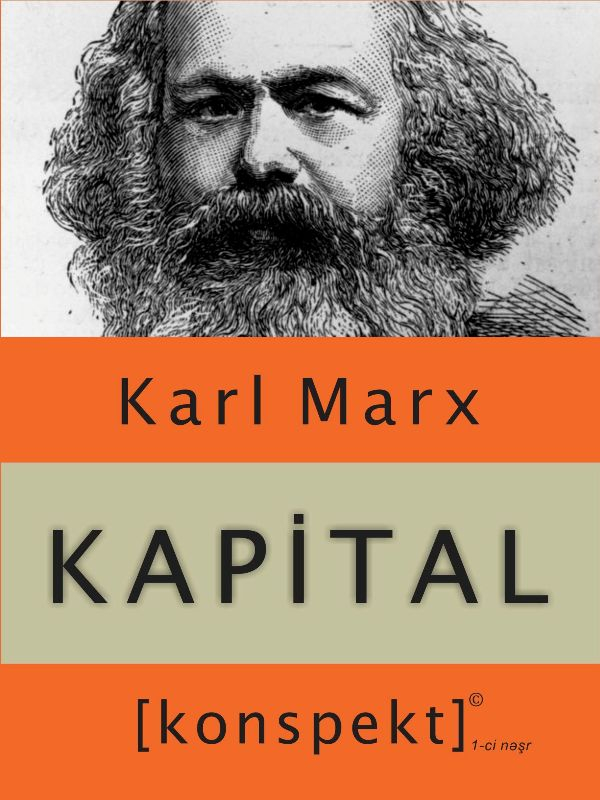The book you are holding in your hand is the conspectus of the first volume of «Capital: Critique of Political Economy» by Karl Marx. The designer of this conspectus has taken on an ex-tremely hard, complex and historical mission to pick the most important, interesting, principal and informative parts of Marx's work, which contains more than 1200 pages, and interconnect and assemble them in this format. As a result, more people can afford spending time on reading this book, which now merely reminds of a Political Economy textbook... Those who need to read Marx's work for scientific purposes have always got the complete huge original «Das Kapital» in their disposal.
Those who hear about this conspectus for the first time will most probably think: «How can you make a conspectus of a genius like Marx?» or « who can dare do it?»
Now let me try to answer these questions.
An entire 150-year period has passed since the first volume of «Das Kapital» was published. Marx wrote this work within 10 years while he lived in London, England, the country with the highest level of capitalism at the time. If we look at the literacy and awareness level as well as psychological state of the people of the time we can easily understand that the main economic notions that Marx mentioned in his book, such as goods, value, money, surplus value, work hours, labor and its value, etc. were new to them. These notions are new even to majority of the modern people. In order to share his extremely precise analysis with a maximum number of people Marx (Before anything else, he was a revolutionary, and this book aimed at awakening masses) used a method which is valid for all times: he brought various examples. Everyone who has read the book completely knows that Marx sometimes used three-four examples in order to explain even a most simple notion. These examples included statistics, pieces of reports, historical events and patterns, stories, poems, legends and even recipes. Often one example is described in two-three pages. We however, tried to minimize the amount of those examples. The most reductions were conducted on bookmarks. If someone compares the original version of the book with our conspectus he/she will immediately see that we have freed the book from hundreds of citations and references (after all, majority of them are useless to an ordinary reader). We assume that Marx used his Jewish patience and German precision not to let any single citation without a bookmark. But the original version of the book has got about 1000 (!) bookmarks. It is not hard to imagine the space these bookmarks require. Moreover, some of them take two-three pages.
However, compactness of this conspectus is not its only advantage. We tried to keep its simplest content which is understood by reading only once. We freed the book from relatively hard sentences and tried to replace them with new, more comprehensible ones.
We regret that in this conspectus too, Marx's heavy sentence structure is preserved. When you read the book you will feel that the initial translation needed to be approached differently in order to make the book lighter. However, we do not believe this would be a realistic and pragmatic approach either in 1960s, when the book was first translated into Azeri, or today. Especially considering Marx's heavy style is caused by some objective reasons.
Firstly, the topic itself is extremely difficult to understand. And, secondly, as you know, Marx was a native German speaker. Those who have some knowledge of German understand that German sentence structure, its word order is quite different than many other languages. For instance, you often have to read a sentence till the end in order to understand what it is saying. And in order to better understand a sentence, you kind of have to divide it into fragments which in turn have their own meanings.
Those who have some knowledge of Marx's biography know that he was a journalist and an editor. And this has directly influenced his writing and his style. «Capital» too is full of critical spirit and some parts of the book remind of long newspaper articles. Marx often gets off the subject and, for example, heavily criticizes some old economist's position. And this often takes pages in the book. We certainly have freed the conspectus from many of such critical parts, which make absolutely no sense in modern days. As a result we have got a much lighter book.
The heavy design of the original book, which takes a lot of space, has also been completely altered in this conspectus. Division to parts has been eliminated, and sections have been preserved.
As a result, number of pages in the book has been reduced at least (!) three times. It might sound like a joke, but apparently Marx's contemporaries did not spend their spare time any way but reading so it was not a problem to increase pages in a book.
www.ann.az
Follow us !











